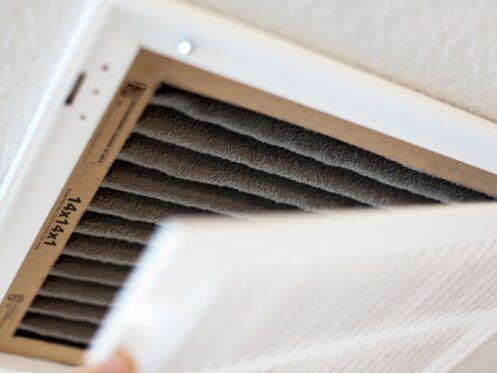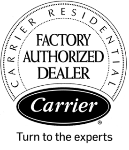Here in Pennsville, NJ and the surrounding areas, the topic of indoor air quality is front and center these days. With the average resident spending as much as 90% of their time indoors, that makes sense. However, not everybody knows what actions they can take to improve their indoor air quality. To help, the experts here at Laury Heating Cooling & Plumbing put together this helpful list of seven ways you can improve your indoor air quality.
1. Change Your HVAC Air Filter Regularly
One of the simplest things you can do to improve your indoor air quality is to change your HVAC air filter regularly. Most HVAC air filters have an expected lifespan of only three months. So, it’s a good idea to change them at least that often. Your HVAC air filter serves as a first line of defense that keeps a great deal of dust and dirt out of the air you breathe.
If you or anyone inside your home or business has allergies or respiratory issues, you should consider changing your HVAC filter even more frequently. In that case, it could help to install a new filter as frequently as once per month. You may even wish to upgrade your HVAC filter to one that traps a higher percentage of allergens. However, you should consult one of the HVAC specialists here at Laury Heating Cooling & Plumbing before doing so. Technicians can also help you determine the appropriate timeframe for changing out your particular air filter.
2. Check and Clean Your Air Ducts
Another thing you can do to improve your indoor air quality is to check your HVAC ducts periodically during routine HVAC maintenance and clean all of your air registers and vents. This will remove additional dirt and dust that might otherwise make it into the air you breathe. The good news is that if you’re keeping up with your HVAC air filter replacement schedules, your registers and vents shouldn’t get that dirty. However, every little bit of cleaning helps to keep your indoor air quality at optimal levels.
You should also have your HVAC ducts cleaned every three to five years, as necessary. Doing so will prevent dust and dirt buildup inside your ductwork, which could harm your indoor air quality. Plus, cleaner ducts lead to a more efficient HVAC system, and less wear and tear over the life of your HVAC. This also positively affects energy costs.
3. Ventilate Your Kitchen
Although you may not realize it, kitchens are a key source of pollutants that make it into your indoor air. If you have gas-powered ovens and cooktops, the combustion process alone can release carbon monoxide, formaldehyde, and a variety of other pollutants into your air. Plus, various chemicals and particles from the food you cool and the cookware you use can affect your indoor air quality.
The best way to remedy these issues is to ventilate your kitchen while you use it. If you have a range hood that vents to the outdoors, you should use it every time you cook. Or, if you have an in-wall ventilation fan, use that instead. If you have no electric ventilation system in your kitchen, you can open up nearby windows and leave them open while you cook and for some time afterward when temperatures allow.
4. Clean All Carpets Regularly
Another great way to improve your indoor air quality is to vacuum and clean all of your carpets as frequently as possible. This is necessary because, over time, carpets can collect all manner of harmful substances you wouldn’t want in your air. It doesn’t take long for them to fill with dust mites, pet dander, dust, dirt, and all kinds of particulate matter.
If you neglect regular vacuuming, everything trapped in your carpet can make it into the air as you walk around. To avoid that, try to vacuum all of your carpets at least once every week. And, you should have your carpets steam cleaned at least once per year to eliminate or neutralize anything your vacuum can’t remove from them.
5. Control Your Indoor Humidity
Did you know that humid indoor air can lead to a variety of indoor air quality problems? For example, moist air can promote the growth of mold and mildew, both of which represent a problem for allergy sufferers and those with respiratory issues. To keep those things in check, you’ll want to keep the humidity in your home between 30-50% at all times. You can check this by purchasing an inexpensive hygrometer.
If your AC system isn’t removing enough humidity in the summer to stay within the proper range, you’ll need a dehumidifier. You can choose a portable one if you only need a little moisture removed from your air. Otherwise, you can install a dehumidifier to work in concert with your HVAC system to handle the job.
6. Add Some Easy-Care Plants
Adding plants to your indoor spaces can also improve indoor air quality. There are plenty of easy-to-care-for plants that work especially well for that purpose. For example, peace lilies do a great job at removing multiple pollutants and live quite happily in low-light spaces. All it needs is some water once per week to stay alive and healthy. If you want an all-purpose plant that improves indoor air quality, consider a snake plant. They can tolerate a wide range of temperatures and light levels and are difficult to kill. As long as you keep their soil moist, they’ll stay alive and remove everything from benzene to formaldehyde to nitrogen oxide from the air around them.
7. Install an Air Purifier
If you prefer more active measures to improve your indoor air quality, you should consider installing an air purifier. You can opt for multiple small air purifiers to clean the air where you spend the majority of your time. Or, you can install an air purification system that filters and cleans your air as it passes through your HVAC system. There are air purification systems that employ complex filtration and UV-light sterilization techniques to eliminate every harmful substance imaginable from your air. Such systems are the gold standard for improving indoor air quality and can serve as an all-purpose solution to multiple kinds of common air pollutants.
Your Local HVAC Specialists
As you now know, your HVAC system plays a major role in your indoor air quality. So, you’ll want a trusted HVAC company to help you keep it clean and in good working order. Laury Heating Cooling & Plumbing has served homeowners and businesses in South Jersey since 1945, offering comprehensive HVAC services, including system installation, repair, and maintenance. We also offer plumbing services, including water heaters, drain cleaning, and pipe repairs. Plus, we have a staff of NATE-certified HVAC technicians and have won multiple industry awards over the years. Financing is also available on approved credit. So, if you’re concerned about your indoor air quality or have an HVAC or plumbing issue in South Jersey and surrounding areas, contact Laury Heating Cooling & Plumbing today!



